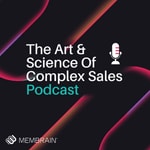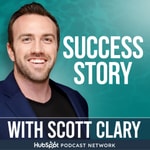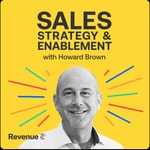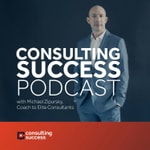Art & Science of Complex Sales – Details, episodes & analysis
Podcast details
Technical and general information from the podcast's RSS feed.

Art & Science of Complex Sales
Membrain
Frequency: 1 episode/7d. Total Eps: 116

Recent rankings
Latest chart positions across Apple Podcasts and Spotify rankings.
Apple Podcasts
🇨🇦 Canada - careers
21/07/2025#63🇫🇷 France - careers
09/07/2025#95🇫🇷 France - careers
08/07/2025#68🇩🇪 Germany - careers
09/06/2025#100🇫🇷 France - careers
26/05/2025#74🇫🇷 France - management
03/09/2024#91🇫🇷 France - management
02/09/2024#78🇫🇷 France - management
01/09/2024#70
Spotify
No recent rankings available
Shared links between episodes and podcasts
Links found in episode descriptions and other podcasts that share them.
See all- https://www.andypaul.com/
150 shares
- https://scottleeseconsulting.com/
13 shares
- https://thewhalehunters.com/
5 shares
RSS feed quality and score
Technical evaluation of the podcast's RSS feed quality and structure.
See allScore global : 42%
Publication history
Monthly episode publishing history over the past years.
Innovative Approaches to Sales Success with Roderick Jefferson
Episode 89
vendredi 23 août 2024 • Duration 42:47
How can the integration of strategies, processes, and technologies revolutionize the customer lifecycle from lead generation to post-sales retention?Join us with Roderick Jefferson, CEO of Roderick Jefferson & Associates.
In this conversation, Roderick unpacks the evolution of sales enablement into broader revenue and go-to-market enablement. Listen as Roderick shares his invaluable insights on aligning business lines, measuring revenue impact, and enhancing talent through deeper discovery and business acumen.
Integrating Sales Enablement (8:52)
In this discussion, the focus is on how to effectively execute sales enablement within an organization. It starts with the necessity of delivering the right information, tools, and support to sales teams, emphasizing the importance of leadership buy-in. Roderick outlines a three-step approach: Listen, Learn, and Lead. He advocates for close collaboration with sales teams by being present in real-time sales interactions, identifying and addressing challenges, and fostering communication between departments like product management, marketing, and HR. Sales enablement is positioned as a strategic partner, not just a support function, and must be deeply integrated into the company culture from the top down to be successful.
Tailoring Sales Enablement to Diverse Needs (17:47)
This discussion explores the role of sales enablement in enhancing system effectiveness and fostering a deeper understanding of data within sales teams. Roderick introduces the concept of "demystifying the dark matter," emphasizing the importance of aligning various technology resources to optimize their use. He categorizes essential tools into six groups, including learning systems, prospecting, marketing automation, communication tools, sales enablement platforms, and revenue intelligence tools. Roderick stresses the importance of understanding and using these tools effectively, as well as tailoring conversations and metrics to different audiences within the organization. He distinguishes between metrics that enablement impacts and those it directly owns. For instance, discussions with BDR/SDR leaders focus on conversion rates and outreach, while conversations with sales leaders center on deal size, velocity, and quota attainment. By speaking the language of each department—whether it's sales, SE, or customer success—enablement can become a true partner, helping sales teams focus more on selling and less on administrative tasks.
The Future of Sales Enablement (28:20)
In this discussion, Roderick reflects on the evolving landscape of sales enablement and the impact of AI on sales roles, particularly the traditional BDR (Business Development Representative) and SDR (Sales Development Representative) positions. He outlines six areas where AI is poised to enhance efficiency and productivity: streamlining lead scoring, automating mundane tasks, providing real-time analytics, enabling personalized sales coaching, optimizing sales processes, and automating customer communications.
Roderick predicts that AI will likely replace the traditional BDR/SDR roles within a year, which could signal a shift back to full-cycle AEs (Account Executives). This evolution raises concerns about the future of entry-level sales positions, which have traditionally served as a stepping stone into sales careers. Without these roles, there is a risk of losing the diversity of thought and fresh perspectives brought by new graduates, potentially leading to an industry dominated by seasoned professionals and the emergence of an "echo chamber" effect.
Shifting Mindsets with Jill Pedersen
Episode 88
vendredi 16 août 2024 • Duration 40:36
If you're looking to enhance your sales team's recruitment and onboarding process, this episode is a must-listen. Join us for an insightful conversation with Jill Pedersen, Practice Partner at SalesStar North Carolina. Jill takes us on her incredible journey—from selling sweet corn as a child to becoming a top performer in the sales industry.
The Art of Prospecting (8:47)
Jill emphasizes the importance of active prospecting and personalized communication in reaching potential clients. She stresses that relying solely on digital communication is insufficient; a multi-platform approach is necessary to determine the preferred communication method of each prospect. Jill outlines her successful prospecting methodology, which involves 21 touch points over three months, using a combination of phone calls, emails, LinkedIn messages, and texts. She highlights the importance of persistence, systematization, and effective pipeline management to maintain consistent follow-ups and maximize outreach success.
Revamping Recruitment (15:53)
In this discussion, Jill and Paul explore the challenges of identifying top sales talent, especially in an era where AI-written resumes are common. Jill emphasizes the need to modernize the hiring process, noting that many companies still rely on outdated methods. She outlines a nine-step hiring framework, highlighting critical areas often overlooked: profiling the ideal candidate, objectively assessing core competencies, and effective onboarding. Jill also shares tips for crafting meaningful interviews, including using assessments to tailor questions and incorporating role-playing scenarios to test candidates' real-world skills and responses.
From Resistance to Engagement (25:35)
Jill recounts a transformative workshop where she shifted a team's perception of sales from resistance to enthusiasm in just three hours. Initially met with skepticism, the team became engaged and excited after learning how sales can be integrated into their culture positively. Jill explains that the key to this transformation is focusing on shifting the mindset from viewing sales as a negative activity to seeing it as a service that builds trust and delivers value. She emphasizes that effective selling is about being a trusted advisor and connecting on an emotional level. The discussion highlights the importance of aligning communication and service with sales principles, even in non-sales roles.
Empowering Women in Sales │ Heidi Solomon-Orlick GirlzWhoSell
Episode 79
vendredi 31 mai 2024 • Duration 44:47
With over three decades of breaking barriers in B2B sales, Heidi Solomon-Orlick, CEO and founder of GirlzWhoSell, joins us to share her passion for empowering the next generation of female sales leaders. Heidi highlights sales as a collaborative, problem-solving process that goes beyond mere transactions, emphasizing the importance of a servant selling mindset for success.
Redefining Sales Leadership (10:17)Paul and Heidi discuss the evolution of sales leadership, with Heidi highlighting that effective leadership involves inspiring and motivating people, translating vision into reality, and balancing strategic and tactical skills. Heidi emphasizes the biases women face in leadership roles, often being labeled negatively for traits celebrated in men. She advocates for changing mindsets from a young age, encouraging girls to embrace leadership, take risks, collaborate, and compete. Girls Who Sell aims to empower young women by providing diverse female mentors and role models, underscoring the importance of developing leadership skills to build more diverse and effective teams.
The Link Between Athletics and Sales Success (15:40)
Paul and Heidi discuss Heidi's background as an alternate on the US equestrian team and how her athletic experiences shaped her approach to sales. Heidi highlights a correlation between high-level athletic competition and success in sales, noting the transferable skills such as leadership and competition. They emphasize the importance of fostering these skills early, particularly in middle school, where confidence in girls tends to decline. Paul commends Heidi for her work in training future sales leaders, recognizing the significance of building confidence and leadership skills early to achieve success in sales and life.
Heidi's Mission to Champion Women in Sales (31:41)
Paul and Heidi discuss how Heidi's career evolved and her passion for empowering women in sales. Heidi shares her journey from working in advertising and marketing to falling into sales in her 30s. Influenced by her entrepreneurial father who discouraged her from entering sales, Heidi felt compelled to prove him wrong. She entered the male-dominated field of business process outsourcing (BPO) sales, where she excelled despite the lack of female role models. Motivated by her successful career and the desire to support other women, especially after the death of her parents in 2019, Heidi founded Girls Who Sell. This organization aims to address gender disparity by focusing on young women, particularly from underserved communities, and developing their sales skills early.
Transformative Sales Strategies │ Mike Esterday
Episode 78
vendredi 24 mai 2024 • Duration 37:32
There's a common thread that connects the passion of salespeople and it goes beyond the rush of closing a deal—it's the stories that drive us. In this heartfelt conversation, we navigate the personal narratives behind the sales drive, such as the profound pursuit of familial respect, and how these stories deepen our understanding of wealth with Mike Esterday, Ceo of Integrity Solutions. Mike is also co-author of a recent sales book - Listen to Sell: How Your Mindset, Skillset, and Human Connections Unlock Sales Performance.
Coaching for Impact (8:42)
Paul asked Mike for advice on coaching salespeople to put their focus more on serving customers, being passionate, taking responsibility, and adding value. In response, Mike introduces the sales congruence model, which involves understanding a salesperson's perspectives on selling, their skills, and their values. Mike advises managers to go beyond surface-level knowledge of products and tasks, encouraging them to ask more probing questions to uncover their sales team's genuine motivations and goals. By aligning personal aspirations with professional responsibilities, managers can enhance their team's motivation and effectiveness. This approach also involves demonstrating the broader impact of sales efforts on customers' lives, which can serve as a powerful motivator for improved performance.
Cultivating a Sales and Coaching Culture (15:06)
In this conversation, Paul seeks insights from Mike on driving cultural change within organizations to emphasize the impact of sales beyond mere techniques. Mike explains that instilling this mindset begins with senior leadership, who must champion a philosophy centered on serving customers and aligning sales efforts with company values. This involves not only training new hires and struggling employees but also ensuring that everyone understands and embraces the organization's approach to sales. Mike emphasizes the importance of aligning sales, marketing, and HR efforts to reinforce this culture. He highlights the broader applicability of these principles beyond sales, emphasizing their value in interpersonal communication and persuasion in various contexts.
Embracing Truth and Taking Ownership (27.56)
In this dialogue, Paul shares a frustrating incident where a planned meeting fell through, emphasizing the need for accountability and thorough pre-call planning. He reflects on the coaching process and its role in confronting objective truths about situations, stressing the importance of taking ownership for outcomes.
Mike reinforces this perspective by advocating for learning from every interaction and embracing responsibility for one's circumstances. He emphasizes the primacy of mindset over external factors in sales success, citing a study showing that attributes like passion and drive outweigh technical skills. Mike highlights the overlooked importance of mindset in sales training, noting its significant impact on performance.
Adapting to Change and AI │ Frank Cespedes
Episode 77
vendredi 17 mai 2024 • Duration 40:15
Join the conversation with Frank Cespedes, a senior lecturer at Harvard Business School as he brings his arsenal of sales wisdom and leadership expertise to our latest episode.
Navigating the Modern Sales Landscape (11:42)
Paul's question revolves around the difference in the ability of sales leaders to lead themselves and its correlation with the success of their sales teams. Frank discusses challenges sales leaders face, including transitioning from individual contributor to manager, the increasing transparency of sales data, and the shift to an omni-channel buying world. He highlights the need for sales leaders to develop financial literacy and adapt to managing both direct sales teams and various channel partners.
Adapting to Change (16:43)
When Paul asks how sales leaders handle rapid changes, Frank suggests sticking to basics. For him, building the right work culture is crucial. This means hiring the right people. Frank points out the challenge of finding good salespeople. He also stresses the importance of training. Using technology for learning is key, according to Frank. He highlights how salespeople learn best from each other. Lastly, Frank talks about performance reviews. He thinks they're vital but often overlooked. Frank believes that by focusing on culture, making smart hires, offering effective training, and conducting thorough reviews, sales leaders can manage change effectively.
Harnessing AI in Sales Leadership 26:38
Frank shares insights drawn from his academic and practical involvement in AI research. He acknowledges the hype surrounding AI but stresses its potential to enhance sales efficiency rather than replace salespeople entirely. Frank highlights the significant portion of salespeople's time spent on customer contact and suggests AI can streamline administrative tasks, allowing more time for essential sales activities. He encourages listeners to focus on practical applications of AI to improve sales productivity rather than getting caught up in grandiose ideas.
People-First Approach │ Neal Glatt
Episode 76
vendredi 10 mai 2024 • Duration 45:47
Scaling a business isn't just about the numbers—it's about the people. From selling popcorn to steering a multi-million-dollar powerhouse, Neal Glatt joins the conversation to reveal the secrets behind assembling a sales force that's not just effective, but extraordinary.
Lessons from Scaling Sales Teams (13:41)
Neal discusses the transformative journey of scaling a sales team from one to forty million in revenue. He emphasizes the importance of intrinsic trust among team members, which was pivotal in their success. Initially, with a small team, trust and familiarity were ingrained, leading to seamless collaboration and problem-solving. However, as the team expanded, maintaining that level of trust became challenging. New team members lacked the shared experiences and understanding, causing friction and necessitating adjustments in working dynamics. Neal highlights the significant time investment required to build trust within a team, often taking up to a year. Despite the potential for quick results in technical training, true transformation in leadership and team dynamics demands a longer-term commitment.
Building Trust through Holistic Coaching (19:22)
Neal discusses his approach to coaching salespeople, emphasizing the importance of establishing trust and addressing individuals' holistic goals. He begins by assuring confidentiality and emphasizing his commitment to the person's overall well-being beyond just sales performance. By delving into personal goals, including family, relationships, and health, Neal aims to demonstrate his genuine care for the individual's success and fulfillment. He challenges conventional expectations of working hours, advocating for a balanced lifestyle while achieving sales targets efficiently. Neal's coaching methodology focuses on maximizing productivity within a reasonable timeframe, often requiring only a few hours of focused effort each day. He integrates technology and scientific insights to streamline the coaching process, ensuring rapid progress without unnecessary complexity.
Harnessing Individual Strengths for Sales Success (37:32)Neal contrasts his style with that of a colleague who excelled in building relational connections with clients, showcasing the diversity of successful sales approaches. He advocates for recognizing and embracing the uniqueness of each salesperson's combination of strengths, rather than conforming to a standardized sales mold. He stresses the value of adapting sales strategies to align with individuals' personalities and intrinsic behaviors, fostering sustainable success and consistent performance.
Sales Leadership Reinvented │ Steve Heroux
Episode 75
vendredi 3 mai 2024 • Duration 40:25
Uncover the secrets to being a top-notch sales leader and building a winning sales team with Steve Heroux, CEO of the Sales Collective. In this episode, we dive into the world of sales, busting myths and emphasizing the power of genuine connections. Prepare yourself for a discussion that will completely transform how you approach sales!
Building a Culture that Attracts Success (15:01)
In a recent conversation, Paul and Steve discussed "pushing and pulling" in sales. Instead of aggressively pushing products, successful salespeople focus on great service, naturally drawing people in. Renowned colleges don't need heavy recruitment; their reputation speaks for itself. Creating a strong organizational culture is like the Field of Dreams: build something worthwhile, and people will come. Traditional sales usually prioritize targets over customer needs. In order to succeed, it’s important to build a culture that attracts talent and values customer satisfaction. This principle applies to successful sports teams like the Patriots and Duke, prioritizing excellence over numbers.
Understanding Salespeople's Needs (24:06)
Steve emphasizes the importance of understanding how salespeople want to be led, rather than imposing leadership styles. He shares insights from his upcoming book, "Salespeople are from Mercury, Sales Managers are from Uranus," highlighting the significant disconnect between salespeople and their managers. Steve discusses how many salespeople feel undervalued and underappreciated, leading to decreased performance. He recounts a story where a top-performing salesperson, Monica, faced a pay cut due to her high earnings. This incident emphasizes how vital it is for companies to recognize and appreciate their sales teams in order to maintain success.
Aligning Motivation with Mission (32:46)
Paul emphasizes the importance of starting with a "why" in sales, aligning personal motivation with a greater purpose. Steve agrees, citing James Clear's insights on the significance of systems over goals. He critiques the traditional reliance on quotas and arbitrary numbers, emphasizing the need for companies to prioritize their salespeople's well-being and intrinsic motivations. Steve argues that salespeople are primarily motivated by personal and familial concerns, urging companies to build a culture that values individuals over revenue targets.
Value-Driven Solutions │Jermaine Edwards
Episode 74
vendredi 26 avril 2024 • Duration 40:24
Join us with Jermaine Edwards, as he shares his learnings on sales leadership, the difference between earning versus proving, the impact of cognitive load, and how we show up for prospects and customers to provide true value.
From Indecision to Possibility Exploration (11:56)Paul asks about the gap between earning the right for attention and proving capability in B2B sales, specifically addressing the issue of indecision as a significant barrier. He wonders if his understanding of this gap is accurate.
Jermaine agrees with Paul's assessment and then delves into the concept of cognitive load, explaining how information overload often leads to indecision. He suggests shifting the sales conversation from justifying decisions to exploring possibilities to engage prospects more deeply. Jermaine emphasizes the importance of helping prospects understand the decision-making process and the risks involved, advocating for a transition from justification-focused discussions to ones centered around possibility exploration.
Solving Customer Problems: The Key to Sales Engagement" (19:24)
Jermaine introduced the concept of "getting access to the level of problems we're trying to solve" and the need to focus on problems the customer wants to solve, rather than those the salesperson believes they can solve. He highlights the importance of listening to customers and understanding their true needs, rather than forcing them down a predetermined path based on the seller's offerings. Jermaine also emphasizes the importance of communicating at the appropriate level of problem-solving, which is crucial for engaging with customers effectively.
Coaching for Strategic Thinking in Sales (27:53)
Without a clear understanding of the purpose behind a sales process, simply enforcing it may yield some results but won't lead to optimization. When discussing these concepts with leaders, Paul wonders if they encounter pushback or skepticism. Jermaine confirms that skepticism is common, as leaders often focus on solving immediate issues without addressing the root cause.
Changing someone’s behavior on how to ask questions is easy, but changing how someone behaves during an entire sales process is much harder. Jermaine also explains that salespeople rely on their coaching, experiences, and independent learning when facing challenges. He advocates for coaching that helps salespeople think better, as improved thinking leads to better actions, rather than solely focusing on improving actions.
Cultivating a Thriving Sales Community │ Mike Stokes
Episode 73
vendredi 19 avril 2024 • Duration 40:19
Meet Mike Stokes, the founder of Indicator. Mike is a groundbreaking entrepreneur reshaping leadership in sales. Mike shares his transition from co-owning a laminating business to becoming a pioneer in sales leadership. He provides a refreshing angle on sales, presenting it as a service that goes beyond mere transactions to guide customers in making enriching decisions.
Essential Traits and Challenges in Sales Leadership (12:24)
Paul and Mike discuss the challenges and essential qualities of effective sales leadership. Mike emphasizes that sales leaders often face diverse challenges and may need more support from leaders who are from a sales background. He highlights the importance of passion, structure, and understanding the team's goals and gaps. Assessing leadership capabilities and addressing missing elements are crucial. Mike also stresses the significance of passion, culture, and inner drive in both sales leaders and their teams. He shares personal insights, noting that a sales leader's role is primarily about supporting and lifting their team rather than excelling in every aspect themselves.
The Impact of AI on Sales Leadership, Community, and Culture (20:34)Mike discusses the evolving role of AI in sales and its potential impact on leadership, community, and culture. He acknowledges AI's significant changes, including increased efficiency and enhanced customer experiences. Mike emphasizes the importance of embracing AI to stay competitive, noting that those who adopt it early will have a competitive advantage. He shares insights from his recent experiences and debates about AI's influence across various industries. Despite initial hesitations, Mike sees AI as a tool that empowers salespeople to become superhuman and enhance their abilities rather than replace them. He expresses excitement about the future possibilities and encourages proactive engagement with AI technology to thrive in the evolving sales landscape.
Strategies for Sales Leaders to Drive Development and Success (28:52)Mike talks about the importance of continual learning and adaptation in the face of constant change, citing the concept of "banny" to illustrate the volatile and unpredictable nature of today's business environment. He highlights the importance for sales leaders to be change experts and to understand what motivates their team members beyond financial incentives. Mike also talks about the significance of results-driven leadership, encompassing both quantitative and qualitative aspects of performance, and also the importance of setting boundaries and understanding one's leadership style while navigating the multifaceted responsibilities of a sales leader.
Insights into Effective Leadership │ Paul O'Donohue
Episode 72
vendredi 12 avril 2024 • Duration 50:18
Join us as we sit down with the Founder & CEO of SalesStar, Paul O'Donohue. Paul was an electrical engineer turned sales transformation leader, whose entrepreneurial spirit led him to create SalesStar, a powerhouse in the international sales arena.
Building a Sales-Driven Culture (17:28)Paul discusses SalesStar's global growth and mindset shift towards achieving excellence in sales transformation. He emphasizes the importance of mindset and root cause analysis in addressing sales challenges. Paul highlights the role of leadership in fostering a positive culture, underscoring the CEO's impact on organizational growth and development.
The Leadership Mindset and Culture (22:29)Paul discusses the importance of a growth-minded approach to leadership, emphasizing openness to new ideas and a commitment to continuous improvement. He shares SalesStar's method for building a strong culture, focusing on aligning with individuals who share the company's values. Paul introduces SalesStar's core values, including "Better Never Stops," "Raving Fans," "Doing Things for the Right Reasons," and "Team First," and their role in shaping the organization's culture.
Aligning Vision with Reality (36:51)Paul discusses aligning top-down goals ("rainbows") with bottom-up perspectives (reality) to find truth in business strategy. He stresses the importance of strategy in focusing on growth areas and a milestone-centric go-to-market process. Paul highlights the need for a scalable sales process, emphasizing SalesStar's custom approach.









